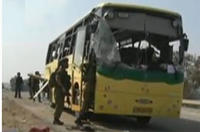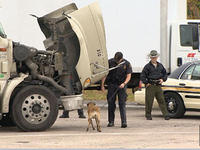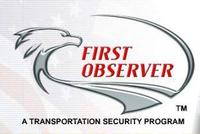-
NICE joins European transportation security consortium
Secured Urban Transportation - European Demonstration (SECUR-ED) consortium aims create a pan-European improvement in mass transportation security which promotes the entire public transport sector; the consortium comprises thirty-nine members, which include all the major stakeholders from across Europe; NICE Systems announced it is a member of the consortium
-
-
Increasing durability, cutting cost of railroad maintenance
Every year, companies that own railroad track across the United States spend millions of dollars maintaining ballast, the crushed rock underneath railroad ties and steel rails; in addition to the high cost, railroads must reroute trains around operations that maintain ballast, delaying the delivery of freight; researchers offer a solution
-
-
Railroad authority investigates threat of unattended trains

The Federal Railroad Administration (FRA) is currently investigating the dangers of unattended freight trains, especially those that carry hazardous materials, following a report by a Seattle television station; in a segment called “Problem Solvers,” KOMO News investigators boarded several freight trains throughout the state without encountering security personnel or crew members
-
-
Plan for cameras and mics in U.K. cabs draws sharp criticism

Privacy advocates in Oxford, Britain are up in arms over plans to install security cameras and audio recording cameras in every taxi; the city council recently passed a plan that would require every taxi driver in town to equip their cabs with the £460 devices by 2015 or have their license revoked
-
-
DHS warns terrorists targeting buses

In a recent Transportation Security Administration (TSA) security bulletin, officials warned state and local authorities that terrorists are increasingly targeting bus networks; John Pistole, the head of the TSA, explained that bus networks are attractive targets for attacks because of their “accessibility” and their “open architecture”
-
-
TSA deploys vehicle inspection teams in Tennessee

Last week in an effort to improve security on U.S. highways, the Transportation Security Administration (TSA) established checkpoints at truck weight stations in Tennessee; working with the Tennessee Department of Homeland Security, TSA deployed Visible Intermodal Prevention and Response (VIPR) teams across the state to inspect vehicles
-
-
Robotic car allows drivers to work while driving

The overall cost of road congestion in the United Kingdom to business is likely to rise to £23-24 billion a year within the next fifteen years; increasing public transport capacity may help, but experts believe that, with people unwilling to give up cars, the solution is autonomous vehicles: they make road journeys safer, more efficient, and allow people to do work while on their way to the office
-
-
Future electric vehicle to run unlimited distances

Electrically powered vehicles (EV) are promising environmentally friendly alternatives for combustion engine-based automobiles; batteries used in present-day EV, however, limit the continuous running distance from one charge; researchers propose a potentially revolutionary solution for powering EVs capable of running unlimited distances
-
-
New rail-sensing technology saves time, energy, money
Leaves, as well as snow and rain, cause problems for trains because they reduce traction and cause wheels to spin on acceleration or to lock when slowing down; researchers are working to solve the age-old problem of leaves on the line delaying trains
-
-
NTSB calls for ban on use of mobile phones by commercial drivers

Citing distraction from the use of a mobile phone by the driver of an 18-wheel semi truck as the probable cause of a crash that killed eleven people, the National Transportation Safety Board (NTSB) recommended banning the use of mobile phones by commercial drivers except in emergencies
-
-
Parking attendants part of U.S. anti-terrorism effort

More than 7,000 parking professionals have been trained in the First Observer parking-specific program developed by the International Parking Institute with the DHS and the Transportation Security Administration
-
-
Groups seek FCC ruling on BART’s cell phone shutdown
An ongoing legal battle in California over whether law enforcement agencies can shut off cell phone service could set the precedent for policies across the United States; in response to the Bay Area Rapid Transit’s (BART) decision to shut down its mobile phone service during a planned protest, several digital rights groups are urging the U.S. Federal Communications Commission (FCC) to take swift action
-
-
Secret Service gets two hi-tech buses

For President Obama’s latest three-day tour of the Midwest, the Secret Service will be using two new armored buses to provide better security; in the past, the Secret Service would lease buses when they needed them and then customize them with security and communications equipment, but officials say these measures were often inadequate
-
-
Anonymous retaliates against BART
The hacking collective Anonymous released personal data on Sunday belonging to more than 2,000 public transport customers in the San Francisco area in retaliation for the Bay Area Rapid Transit (BART) system’s shutdown of mobile phone service on Thursday night
-
-
San Francisco to install real-time surveillance on buses
Thanks to a $6 million DHS grant San Francisco’s MUNI buses will soon be equipped with a network of sophisticated high-tech video cameras that will allow the transit agency to view footage in real-time
-
- All
- Regional
- Water
- Biometrics
- Borders/Immig
- Business
- Cybersecurity
- Detection
- Disasters
- Government
- Infrastructure
- International
- Public health
- Public Safety
- Communication interoperabillity
- Emergency services
- Emergency medical services
- Fire
- First response
- IEDs
- Law Enforcement
- Law Enforcement Technology
- Military technology
- Nonlethal weapons
- Nuclear weapons
- Personal protection equipment
- Police
- Notification /alert systems
- Situational awareness
- Weapons systems
- Sci-Tech
- Sector Reports
- Surveillance
- Transportation
Advertising & Marketing: advertise@newswirepubs.com
Editorial: editor@newswirepubs.com
General: info@newswirepubs.com
2010-2011 © News Wire Publications, LLC News Wire Publications, LLC
220 Old Country Road | Suite 200 | Mineola | New York | 11501
Permissions and Policies
Editorial: editor@newswirepubs.com
General: info@newswirepubs.com
2010-2011 © News Wire Publications, LLC News Wire Publications, LLC
220 Old Country Road | Suite 200 | Mineola | New York | 11501
Permissions and Policies
